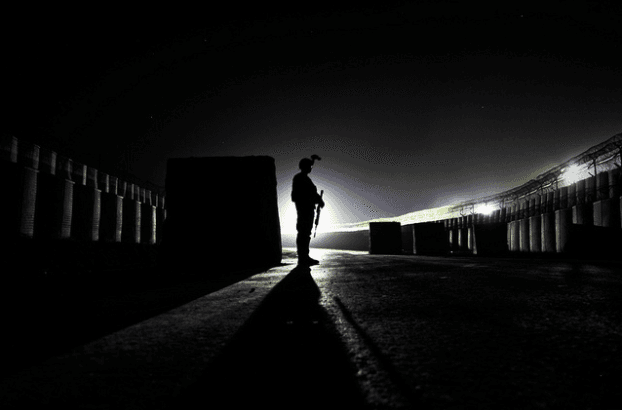A national security expert talks about the things we should (and shouldn’t) be afraid of
A soldier is silhouetted here, keeping watch.
Why are Americans so afraid of ISIS when you’re more likely to be crushed by a falling television than killed by terrorists? Why do we fear far-off outbreaks of diseases like Ebola and SARS (severe acute respiratory syndrome) when climate change threatens to drown parts of the Eastern Seaboard?
According to Juliette Kayyem, former assistant secretary for intergovernmental affairs at the Department of Homeland Security and author of the book “Security Mom,” it’s because we fear the unknown.
For example, despite the fact that guns kill tens of thousands more Americans every year than terrorists, polls consistently show that we’re much more afraid of the latter than the former. Kayyem says that’s because we’re used to living in a culture of guns. On the other hand, the idea of a foreign actor who wants to harm you and your family is much more removed from our daily experience — and more terrifying.
“The purposeful targeted aspects of terrorism give it a unique place in our psychology, our sense of stability and our sense of protecting our children,” she says. “And so while it is completely out of whack, statistically, I also get it.”
The root of much of this fear is 9/11 and its aftermath. “We had stratified the world into foreign threats and domestic peace [before 9/11],” Kayyem says, “and it always was ‘over there.’” Today, with the rise of ISIS and lone-wolf domestic terrorists, the modern fight feels much closer to our doorsteps — even if it is very unlikely that we would ever become directly involved.
For a long time, Kayyem says, this same kind of misplaced fear drove our national security agencies. They focused on preventing big, mass casualty terrorist attacks. Then there was a system-wide wake-up call in 2005 when Hurricane Katrina devastated New Orleans.
“For people in my field, including counterrorism,” she says, “to look at an apparatus of response that could not save an American city from drowning, you realized, ‘Oh my gosh. We were too focused on one particular scary thing that was low probability, high consequence. Maybe we should look at an all-hazards approach to thinking about our safety and security.'”
When it comes to what we should really fear, climate change tops Kayyem’s list. Even in a year when three presidential debates went by with barely a mention of climate change, the national security apparatus is taking notice.
“The movement of people and the fight for resources is why wars are fought, and that’s what we anticipate,” she says. “When someone says climate change is the biggest existential threat, they don’t mean ‘because you’re going to get wet …’ It’s actually about defense and national security.”
Despite the fact that many Americans’ security concerns are misplaced, Kayyem has come to terms with it. “I think it’s the government’s responsibility to minimize the fear, minimize the hysteria,” she says. “But I also think we need to be sympathetic to people’s rational fear of, for example, losing a child. You can tell me my child’s chances of dying from ISIS are .0001 percent. But if that percentage is my kid, that’s an existential crisis.”
This story was first published by PRI's Innovation Hub.
We want to hear your feedback so we can keep improving our website, theworld.org. Please fill out this quick survey and let us know your thoughts (your answers will be anonymous). Thanks for your time!
